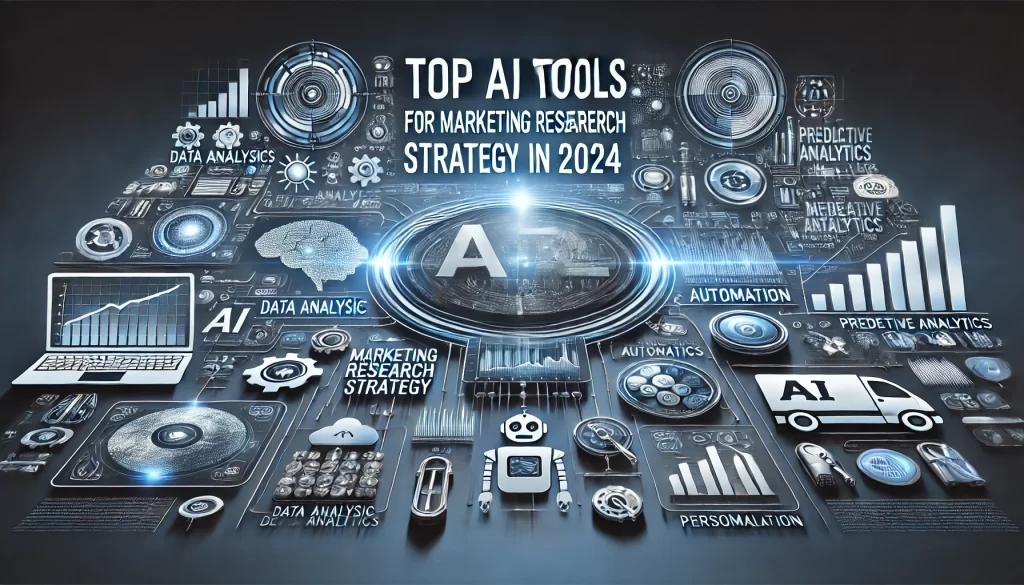The evolution of AI has led to a new era of technological innovation in marketing research strategies. Tools like Jasper AI and SmartWriter.ai use natural language processing (NLP) to generate high-quality textual content. Here are the top AI tools for Marketing Research strategies that are reshaping the industry, focusing on their capabilities in predictive analytics, market segmentation, conversational AI, and more.

The adoption of AI in marketing is rapidly increasing. A significant number of Chief Marketing Officers (CMOs) have already integrated generative AI tools into their strategies, with adoption rates continuing to rise. As public awareness and acceptance of AI grow, particularly among younger demographics, its role in marketing is expected to expand further. eMarketer forecasts that more than half of Americans aged 12 to 44 will be using generative AI by 2025.
According to Capgemini research, 96% of organisations have identified generative AI as a crucial agenda item in their boardrooms, highlighting its integral role in shaping the future of marketing strategies and customer engagement.
AI in marketing refers to the application of advanced algorithms and machine learning models to automate and enhance marketing activities. In simpler terms, AI enables marketers to analyse vast amounts of data to uncover patterns and insights that inform strategic decision-making.
Using AI, marketers can gain deeper insights into customer behaviours and preferences. Modern generative AI technologies can even generate new content, such as text and images, based on existing data inputs provided by humans.
AI tools for marketing research strategies enhance market segmentation
AI-driven market segmentation refines audience targeting by identifying nuanced customer segments based on behavioural patterns and preferences. Machine learning algorithms analyse complex data sets in real-time, allowing marketers to tailor campaigns with precision, enhance customer engagement, and improve ROI.
Nike employs AI tools to segment its customer base effectively. By analysing customer data such as purchase history, browsing behaviour, and geographical location, Nike identifies distinct customer segments with specific preferences and buying patterns.
Coca-Cola uses AI-powered market segmentation to target diverse consumer groups globally. By analysing social media interactions, consumer feedback, and sales data, Coca-Cola identifies regional preferences and cultural trends.
L’Oreal utilises AI tools for precise market segmentation in the beauty industry. By analysing customer demographics, skincare concerns, and purchasing behaviours, L’Oreal identifies niche market segments and develops personalised marketing strategies.
Predictive analytics for customer insights using AI Tools in marketing research strategy
Predictive analytics powered by AI revolutionise customer insights in marketing research strategy. By analysing vast datasets, AI models forecast customer behaviour and preferences with unprecedented accuracy. This capability enables marketers to anticipate trends, personalise customer experiences, and optimise marketing strategies for maximum impact.
Netflix uses AI-powered predictive analytics to recommend movies and TV shows based on the user’s viewing history, preferences, and behaviour. By analysing large datasets, Netflix predicts what users might want to watch next, personalising the user experience and increasing viewer engagement.
Amazon leverages predictive analytics to forecast customer purchasing patterns. By analysing past purchases, browsing history, and demographic data, Amazon predicts products that customers are likely to buy.
Starbucks uses AI-driven predictive analytics to enhance customer loyalty programs. By analysing customer transaction data and preferences, Starbucks predicts individual customer behaviours such as purchasing frequency and preferred products.
Conversational AI and Customer Engagement Tools in Marketing Research Strategy
Conversational AI platforms use natural language processing (NLP) to interact with customers in real-time. These AI-powered chatbots and virtual assistants provide personalised support, answer queries, and guide customers through purchasing decisions. By enhancing customer engagement, businesses develop deeper relationships and increase conversion rates.
Bank of America uses AI-powered chatbots to enhance customer service and engagement. The chatbots provide 24/7 support to customers, answering queries about account balances, transaction history, and financial advice.
H&M integrates AI-driven virtual assistants into its online shopping experience. These assistants help customers find products, suggest styling tips, and provide information about availability and sizing.
Sephora employs AI-powered chatbots to offer personalised beauty advice and product recommendations. These chatbots analyse customer preferences, skincare concerns, and purchase history to provide tailored suggestions for makeup and skincare products.
Here are the innovative AI Tools for marketing research strategies in 2024:
Jasper AI helps in personalised content generation for marketing with its natural language processing (NLP) algorithms. Marketers can effortlessly scale their content efforts, from engaging blog posts to compelling email copy, enhancing both productivity and message consistency.
IBM watson Studio: IBM watson Studio is a comprehensive AI platform that integrates machine learning, data analytics, and deep learning capabilities. It helps marketers analyse large datasets to uncover insights for targeted campaigns and customer segmentation.
Google Cloud AI: Google Cloud AI offers a suite of AI tools, including natural language processing (NLP) and image recognition. Marketers use it to enhance customer interactions through chatbots, sentiment analysis, and personalised recommendations.
Whalesync proves as a game-changer in SEO with its programmatic approach. By analysing search trends and user behaviours, Whalesync optimises website content, boosting organic traffic and search rankings effectively.
HubSpot AI is for delivering actionable insights that enhance customer relationships. From automating lead scoring to predicting customer behaviours, HubSpot AI empowers marketers to craft targeted campaigns that resonate with their audience.
SmartWriter.ai excels in email marketing, using machine learning to tailor email content based on customer preferences. This tool significantly improves campaign performance metrics such as open rates and conversions, driving impactful engagement strategies.
Grammarly, renowned for its AI-driven writing assistance, ensures error-free and compelling content across various platforms. Its capabilities extend beyond grammar correction to enhancing overall writing style, maintaining brand voice consistency effortlessly.
Drift introduces conversational AI through its chatbots, enhancing customer interaction and support in real-time. Marketers can personalise customer experiences, capture leads, and increase conversions through proactive engagement strategies.
Canva revolutionises graphic design with AI-powered tools that simplify the creation of visually captivating marketing assets. From social media graphics to promotional videos, Canva empowers marketers to produce professional-quality content without graphic design expertise.
Surfer SEO stands out for its data-driven SEO optimisation, guiding marketers to align their content with search engine preferences effectively. By analysing top-ranking search results, Surfer SEO streamlines on-page SEO efforts for enhanced visibility and traffic.
Designs.ai caters to marketers seeking polished design solutions with minimal effort. This AI tool offers templates for diverse marketing collaterals, enabling users to create visually appealing content tailored to brand specifications.
Pecan AI excels in predictive analytics, empowering marketers to anticipate customer behaviours and optimise marketing strategies accordingly. By leveraging AI-powered insights, Pecan AI helps businesses enhance customer engagement, drive sales, and maximise ROI.
Integrating these AI marketing tools into your strategy isn’t just a trend but a strategic imperative for staying ahead in 2024 and beyond. By using AI’s power, businesses can reach new levels of efficiency, personalisation, and strategic insight, driving sustainable success in the competitive global market.

Pallavi Singal is the Vice President of Content at ztudium, where she leads innovative content strategies and oversees the development of high-impact editorial initiatives. With a strong background in digital media and a passion for storytelling, Pallavi plays a pivotal role in scaling the content operations for ztudium’s platforms, including Businessabc, Citiesabc, and IntelligentHQ, Wisdomia.ai, MStores, and many others. Her expertise spans content creation, SEO, and digital marketing, driving engagement and growth across multiple channels. Pallavi’s work is characterised by a keen insight into emerging trends in business, technologies like AI, blockchain, metaverse and others, and society, making her a trusted voice in the industry.










